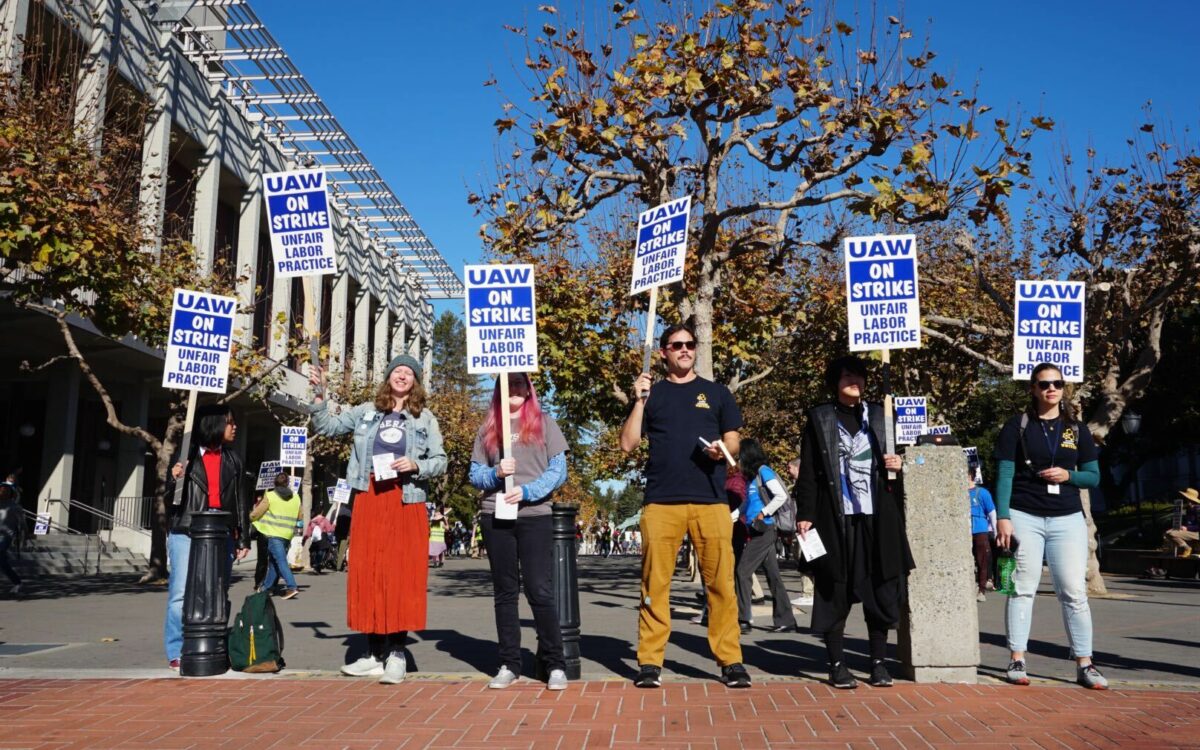Many classes and programs disrupted across the ten-campus system as strike enters second day.
Demanding better pay, more benefits and job security, 48,000 academic workers in the University of California system continued striking for a second day Tuesday, resulting in canceled classes and halted research.
Academic workers and their supporters formed picket lines across the university system that includes 10 campuses and Lawrence Berkeley National Laboratory. The strike is shuttering laboratories and canceling classes just ahead of midterm exams. Some disruptions were a result of teaching assistants’ absences, but some professors also canceled courses in solidarity with strikers.
The strike, which began Monday morning, involves postdoctoral scholars, academic student employees such as teaching assistants, graduate student researchers and academic researchers in California’s preeminent public research university system. Strikers teach many undergraduate classes and often lead discussion sections in courses.
“We teach the classes, grade the papers, and perform the cutting-edge research that has earned UC its reputation as the best public university in the world and the global leader of R1 research institutions,” said a statement from Student Researchers United. “In short, UC works because we do.”
University of California Student Association is encouraging undergraduate students to support the strike by joining the picket line, encouraging professors to cancel classes and donate to the strike fund.
“It looks like campus is completely shuttered at the moment, and it’s real proof of our power,” Tanzil Chowdhury, a bargaining team member with UAW and a graduate student research assistant at the Lawrence Berkeley National Lab, told UC Berkeley’s The Daily Californian.
Workers are demanding higher wages, improved parental leave and child care support, reduced housing costs and support for international scholars. All four bargaining units are represented by the United Auto Workers.
The bargaining committee proposes a $54,000 minimum salary for graduate workers, $70,000 minimum for postdoctoral workers and 14% salary increase for academic researchers. It also proposes capping rent for on-campus housing, providing $2,000 monthly for child care, and subsidies and incentives for public transportation and biking. It also asks for longer appointments for its workers to ensure job security. The union also wants the university to reimburse visa fees and nonresidential tuition for its international workers.
The University of California says it has countered with wage proposals that would put workers in the system on par with those of highly selective private universities.
“The wage proposals offered to the UAW, if accepted, would place UC’s academic employees at the top of the pay scale among public AAU universities and, in fact, are more comparable to what private universities such as Harvard, MIT, and USC offer,” said the University of California in a statement.
Emiko Gardiner was on the picket line early Tuesday morning at UC Berkeley. She’s a first-year astrophysics PhD student who teaches four discussion sections – totaling about 100 students -for an undergraduate introductory astronomy course.

She’s paid for 20 hours of work each week, but sometimes works additional hours. Gardiner’s position as a graduate student instructor, often referred to as GSI, pays hers about $41,000 gross income per year in one of the highest cost of living areas in the United States.
Her apartment rent consumes about 35 percent of her gross pay, she said. Gardiner commutes to campus by bus, which takes anywhere from 30 minutes to an hour.
“We all want to get back to work, so I just want to urge UC to come to the bargaining table in good faith so that we can get back to doing our jobs,” she said.
Fellow striker Jack Schrott is a PhD student in the physics department, where he also works as a graduate student researcher in a lab and mentors students.
While Schrott’s rent costs about 30% of his monthly income, his peers and friends often pay closer to 40% to 50% of their monthly salary.

“The housing insecurity that a lot of us feel definitely weighs on our ability to work well in our research environments and also as graduate student instructors,” said Schrott, who is paid about $40,000 a year and estimates he works upwards of 50 hours per week despite having a contract that pays him to work 20 hours weekly.
A favorable contract, he said, could be “not just a big win for people working within the UC system and struggling to find housing in these expensive housing markets, but could create a shift in how we pay academic workers countrywide.”
Contrasting activities continued on the UC Berkeley campus on Tuesday. A large crowd of cheering students marched in support of the strikers at the campus’ main entrance and around its bell tower. Elsewhere on campus, many students could be found doing schoolwork on their laptops. Inside the Martin Luther King Student Union building, study areas were packed despite the strike.
The academic workers have found support from 33 members of the state Assembly who signed a letter last week urging UC President Michael Drake to cease “unfair labor practices” and warning that the strike could result in “mass disruption.” It noted that the union filed over 20 unfair labor practices against the university.
“The UC is one of the top public university systems and research institutions in the world, in no small part because of its ability to attract the most talented scholars from a wide array of backgrounds,” the letter read. “But the UC system cannot live up to its mission and reputation if its own employees do not feel respected.”
